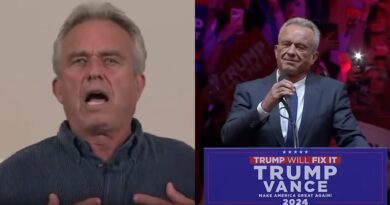Biden town hall: Former VP faces voters in ABC News event from Philadelphia, President Trump holds competing televised event in Miami

Trump was defensive about his administration’s handling of the coronavirus, which has claimed more than 215,000 American lives, and evasive when when pressed about whether he took a required COVID-19 test before his first debate with Biden. Angry and combative, he refused to denounce the QAnon conspiracy group -and only testily did so on white supremacists.
The president also appeared to acknowledge he was in debt and left open the possibility that some of it was owed to a foreign bank. He insisted that he didn’t owe any money to Russia or any “sinister people” and suggested that being $400 million in debt was a “very very small percentage” compared to his overall assets.
Biden, appearing nearly 1,200 miles away, denounced the White House’s handling of the virus, declaring that it was at fault for closing a pandemic response office established by the Obama administration in which he served. Though vague at times, he acknowledged it was a mistake to support a 1994 crime bill that led to increased Black incarceration and suggested he finally will offer clarity on his position on expanding the Supreme Court if Trump’s nominee to the bench is seated before Election Day.
WATCH: Faced with two town halls on separate channels, some voters say they’re tuning out
Trump, less than two weeks after being diagnosed with COVID-19, dodged directly answering whether he took a test the day of the Sept. 29 debate, only saying “possibly I did, possibly I didn’t.” Debate rules required that each candidate, using the honor system, had tested negative prior to the Cleveland event, but Trump spoke in circles when asked when he last tested negative.
It was his positive test two days later that created Thursday’s odd spectacle, which deprived most viewers of a simultaneous look at the candidates just 19 days before Election Day. The moment seemed fitting for a race unlike any other, as yet another campaign ritual changed by the pandemic that has rewritten the norms of society.
The presidential rivals took questions in different cities on different networks: Trump on NBC from Miami, Biden on ABC from Philadelphia. Trump backed out of plans for the presidential faceoff originally scheduled for the evening after debate organizers said it would be held virtually following his COVID-19 diagnosis.
VIDEOS: Highlights from the first presidential debate
The town halls offered a different format for the two candidates to present themselves to voters, after the pair held a chaotic and combative first debate late last month. The difference in the men’s tone was immediate and striking.
Trump was Trump. He was loud and argumentative, fighting with the host, Savannah Guthrie, complaining about the questioning – and eventually saying for the first time that he would honor the results of a fair election, but only after casting an extraordinary amount doubt on the likeliness of fairness.
“And then they talk ‘Will you accept a peaceful transfer,’” Trump said. “And the answer is, ‘Yes, I will.’ But I want it to be an honest election, and so does everybody else.”
He again sought to minimize revelations from a New York Times investigation that he has more than $400 million in debt and suggested that reports are wrong that he paid little or no federal income taxes in most years over the past two decades. He insisted that Americans should not be alarmed by his debt and repeatedly insisted that he is “underleveraged.”
“It’s a tiny percentage of my net worth,” Trump said of his reported debt. But he left open the possibility that some of his debt is owed to a foreign bank by saying. “No, I don’t owe Russia money. I owe a very, very small, it’s called mortgages.”
Biden meanwhile, took a far different, softer, approach with audience questions. The former vice president, who struggled growing up with a stutter, stuttered slightly at the start of the program and at one point squeezed his eyes shut and slowed down his response to clearly enunciate his words. At times his answers droned on.
Dressed in a blue suit and holding a white cloth mask in one hand, the Democratic nominee also brought a small card of notes on stage and referred to it while promising to roll back tax cuts for the wealthiest Americans. He said doing so would save, as he consulted his notes, “let me see… $92 billion.”
Biden vowed to say before Election Day whether he will support expanding the number of justices on the Supreme Court if Democrats win the presidency, the Senate and hold the House after November.
He has for weeks refused to answer the question but went further Thursday night. He said, “I’m still not a fan” of expanding the court, but that his ultimate decision depended on how the confirmation of Amy Coney Barrett to the Supreme Court “is handled” and “how much they rush this.”
Biden also blasted Trump’s foreign policy, declaring that “‘America first’ has made ‘America alone’” and “This president embraces all the thugs in the world.” He turned introspective when asked what it would say if he lost.
“It could say that I’m a lousy candidate, that I didn’t do a good job,” Biden said. “But I think, I hope that it doesn’t say that we’re as racially, ethnically and religiously at odds as it appears the president wants us to be.”
Biden said he plans to participate in next week’s debate but that he would ask Trump to take a COVID-19 test before arriving. “It’s just decency” for everyone around him, including non-candidates like camera operators, Biden said.
The two men are still scheduled to occupy the same space for a debate for a second and final time next week in Nashville. But the cancellation of Thursday’s debate still reverberated for both campaigns.
Trump and Biden battled on Sept. 29 in Cleveland in a debate defined both by the president’s constant hectoring of his opponent, which sent his support lower, and by its place on the calendar: just two days before Trump announced he had tested positive for coronavirus.
Trump was hospitalized for three days, and while he later convalesced at the White House the debate commission moved to make their second debate remote – which the president immediately rejected.
Copyright © 2020 by The Associated Press. All Rights Reserved.
*** This article has been archived for your research. The original version from WTVD-TV can be found here ***


